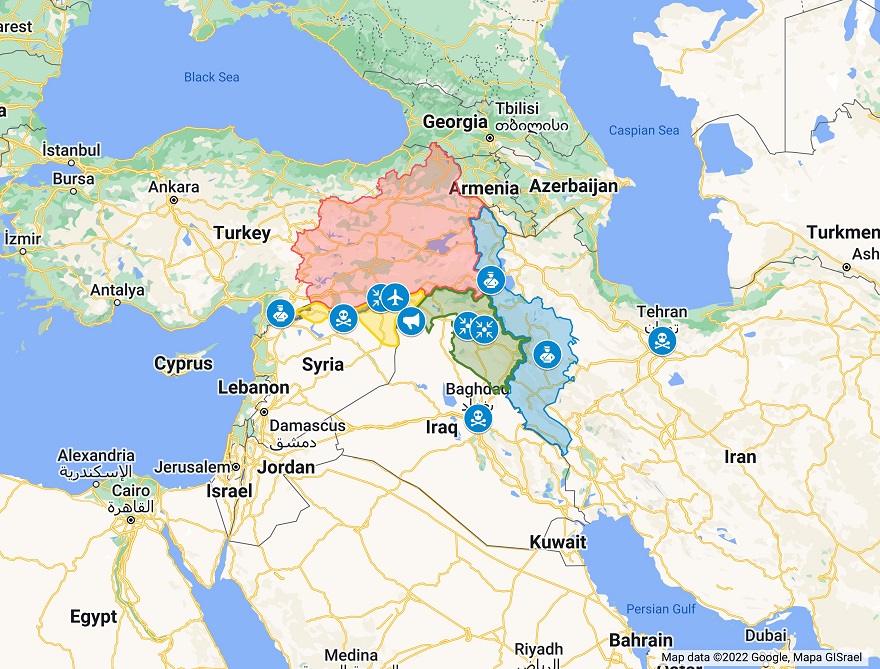1.5K
Iran
- The Democratic Party of Iranian Kurdistan (PDKI) and Kurdistan Democratic Party of Iran (KDP-I) concluded two years of reunification talks by meeting on August 2 and discussing “the final stages” of the process. During the meeting, which was chaired by PDKI head Mustafa Hijri and KDP-I leader Khalid Azizi, it was decided Hijiri and Azizi will co-lead a reunited PDKI until the next party congress. The KDP-I is the largest political party in Iranian Kurdistan and split from the PDKI in 2006.
- Nine Iranian human rights organizations accused the Iranian regime of disseminating disinformation by accusing four detained members of the Komala Party of Iranian Kurdistan of working for the Mossad. The nine organizations demanded Iranian authorities reveal the locations and conditions of the detainees and called for the intervention of international human rights organizations. The fate of Mohsen Maroofi, Pezhman Fatehi, Hazhir Faramarzi, and Wafa Azarbar has remained unknown since their arrest last month.
- Iranian security forces arrested several Kurdish activists last week, including Omed Shadikha and Kazem Tabenak in Shinno, Navid Koneposhi and Star Arjzanki in Marivan, and Aram Afazli in Sanandaj (Sena). According to the Hengaw Organization for Human Rights, Iranian authorities arrested 600 Kurds and executed 64, including political prisoners Haider Qurbai, and Fairoz Mosalao, during Iranian President Ebrahim Raisi’s first year in office.
Iraq
- Muqtada al Sadr’s supporters demonstrated in Baghdad’s Green Zone for the second week in a row. Al Sadr asked his supporters to leave the parliament building and shifted his demands towards “solving” Iraq’s governing crisis and holding new elections. Iraq’s current prime minister, Mustafa al Kadhimi, attempted to solve the ongoing impasse by initiating a national dialogue, but al Sadr reaffirmed his demands on Saturday. Concurrently, the Iranian-backed bloc known as the Coordination Framework outlined its conditions for early elections, which include “respecting the constitutional institutions and not disrupting their work.” In addition, leaders from the Patriotic Union of Kurdistan (PUK) and Kurdistan Democratic Party (KDP) agreed to “work for a unified position of Kurdish political parties in light of the challenges facing Iraq and the Kurdistan Region.”
- Yazidi spiritual leader Mir Hazem commemorated the eighth anniversary of the Yazidi genocide on August 3. “Kurdistan and the Yazidis are one and will never be separated,” said Hazem. Simultaneously, the Committee for the Investigation of Yazidi Abductees in the Kurdistan Regional Government (KRG) released a report featuring updated statistics regarding the Yazidi genocide’s victims. According to the report, the fate of 2717 kidnapped Yazidis, 1444 males and 1273 females, remains unknown. 146 were confirmed deceased. Additionally, 3,554 abducted Yazidis, including 1207 women, 339 men, and 1051 children, have been rescued.
- US Assistant Secretary of State for Near Eastern Affairs Barbara Leaf accused a Chinese company of selling Iran the drones wielded by Iranian-backed militias during a Senate Foreign Relations Committee hearing on August 4. “They’re [drones] not provided by the state, but the state does not attempt to curtail that flow,” said Leaf. Iranian proxies in Iraq have launched dozens of drone attacks since 2019, including several that targeted US facilities in Erbil.
Syria
- On Saturday, a Turkish drone strike in Qamishli’s industrial quarter killed four people, including two children, a civilian, and a member of the Syrian Democratic Forces (SDF). Moreover, Turkish proxies conducted several indirect fire attacks in Ain Essa that killed an SDF member named Hewa Baran last Tuesday and wounded a civilian on Thursday. Additional indirect fire attacks targeted Tal Rifaat, Tal Tamer, and the towns of Amuda and Zarkan. On August 5, Turkish President Recep Tayyip Erdogan met with his Russian counterpart Vladimir Putin in Sochi and discussed several issues, most notably Syria. Erdogan claimed the meeting was “fruitful” and will “open a very different page in Russian-Turkish relations.” Erdogan and Putin previously participated in a meeting with Iranian leaders in Tehran three weeks ago, where Iran and Russia voiced opposition to a new Turkish incursion into Syria. That said, it is unclear if increased economic cooperation between Russia and Turkey will lead Moscow to support a new Turkish operation targeting Syrian Kurds.
- According to the Syrian Observatory for Human Rights (SOHR), disagreements over smuggling revenues sparked infightings between two scouts of the Turkish-backed Sultan Murad faction in the occupied Afrin. The SOHR reported that the group is involved in human trafficking and smuggling. Dozens of battles have occurred between Turkish proxies since the occupation of Afrin in 2018.
Turkey
- The Pro-Kurdish Peoples’ Democratic Party (HDP) held massive rallies in Diyarbakir (Amed) and Istanbul, calling for peace under the slogan “We are the solution. No to Wars and Exploitation.” Thousands of supporters participated as the HDP co-leader Parvin Buldan delivered remarks, accusing the government of “attacks” on her party. “The HDP, which has a strong voice and a power to solve every problem of Turkey, is a party that struggles in this country,” said Buldan. Separately, the co-chair of the HDP, Mithat Sancar, met with the Kurdistan Democratic Party of Turkey (KDP-T), discussing the “Democratic Alliance” for 2023 elections, led by the HDP with other Kurdish and left parties. “We want to make it an alliance that will include other Kurdish parties,” said Sancar.

